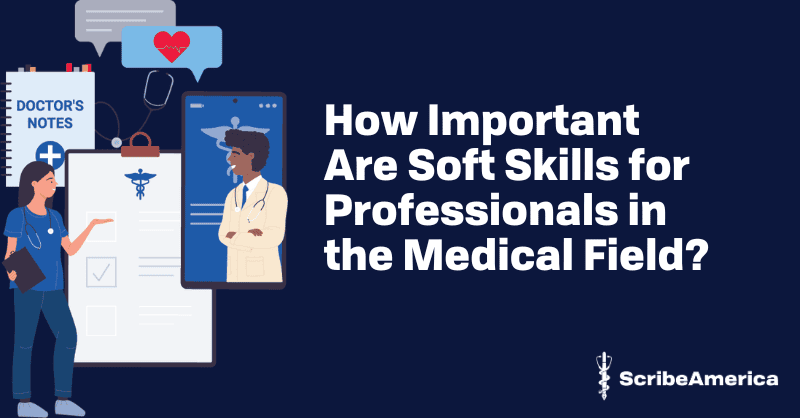Key Points:
- Patient Safety and Outcomes: Strong soft skills in healthcare (communication, teamwork) significantly reduce medical errors and improve patient adherence to treatment.
- Core Soft Skills: Key attributes include Empathy, Active Listening, and Collaboration.
- Modern Demands: Essential cognitive and personal skills are now mandatory, such as Emotional Intelligence (EQ), Critical Thinking, and Resilience.
- Universal Requirement: Soft skills for healthcare professionals are crucial for everyone from doctors and nurses to support roles like medical scribes and operations managers.
In the fast-paced and highly demanding world of healthcare, medical professionals are not only valued for their clinical expertise but also for their ability to navigate complex interpersonal dynamics and remain compassionate. The importance of soft skills in the medical field cannot be overstated. From doctors and nurses to medical scribes and care navigators, mastering soft skills is a key factor in delivering exceptional patient care and fostering a positive work environment.
Understanding the significance of soft skills for medical professionals
In the medical field, soft skills encompass a wide array of interpersonal attributes that go beyond technical know-how.
How important are soft skills for medical professionals? Communication, empathy, teamwork, adaptability, and time management are just a few examples of these critical skills. While hard skills are essential for diagnosing and treating medical conditions, soft skills in healthcare are equally vital for building meaningful relationships with patients and delivering care tailored to their individual needs.
Soft Skills in Healthcare: The Key to Patient-Centered Care and Safety
Soft skills play a pivotal role in patient-centered care and, critically, patient safety.
- Effective Communication & Active Listening: This is crucial in ensuring that patients understand their diagnoses, treatment plans, and medication instructions. Clear communication between staff (doctor-nurse, shift handovers) significantly reduces the risk of medical errors, which a major competitor points out accounts for a substantial percentage of adverse events in healthcare settings. Active listening ensures all concerns are heard and acknowledged, preventing misunderstandings.
- Compassion and Empathy: These skills help healthcare professionals connect with patients on a personal level, alleviating fears and building trust. Empathy is not just about being nice; it directly improves patient adherence to treatment and fosters a therapeutic bond.
- Teamwork and Collaboration: Healthcare is inherently collaborative. Professionals with strong teamwork skills, including conflict resolution, ensure seamless coordination among interdisciplinary teams, which is essential for complex patient care.
Medical professionals who excel in soft skills can create a supportive environment that contributes to better patient outcomes and increased patient satisfaction. Furthermore, improved communication and patient trust have been shown to decrease conflict and litigation against practitioners.

Expanding the Spectrum: Essential Soft Skills for Modern Medical Practice
Modern healthcare demands more than just traditional interpersonal skills. Critical personal and cognitive soft skills are now mandatory:
Emotional Intelligence (EQ)
Emotional Intelligence is the ability to recognize, understand, and manage one's own emotions, and to recognize, understand, and influence the emotions of others. For a professional, high EQ means maintaining professionalism and composure under stress, being self-aware of one's impact on a patient or team, and handling difficult news with tact and sensitivity. This is vital in the high-stress, emotionally-charged medical environment.
Critical Thinking and Problem-Solving
In healthcare, situations change rapidly. Professionals must use critical thinking to quickly bring together disparate information, evaluate the strengths and weaknesses of alternative solutions, and make the best decisions under pressure. This skill goes beyond diagnosis—it applies to logistical and ethical dilemmas daily, proving just how important are soft skills for medical professionals.
Resilience and Stress Management
The demanding nature of the medical field requires resilience, the capacity to recover quickly from difficulties or setbacks. Soft skills for healthcare must include effective stress management techniques to safeguard the professional's mental well-being and prevent burnout, which in turn protects patients from potential errors due to fatigue or emotional strain.
The Role of Medical Scribes, Care Navigator Guiding with Empathy
Jobs like medical scribes and veterinary scribes have emerged as valuable contributors to the healthcare system. Such professionals are responsible for documenting patient encounters, maintaining records, and facilitating communication between healthcare providers. In doing so, they hone their soft skills, especially communication and attention to detail. A proficient medical scribe not only ensures accurate documentation but also fosters effective communication within the healthcare team.
Care navigators are another group of professionals who rely heavily on soft skills. These individuals help patients navigate the complex healthcare system, schedule appointments, and understand their insurance coverage. Empathy is a cornerstone of their role, as they often interact with individuals facing health challenges, which proves that soft skills are crucial for medical professionals. By mastering this aspect, care navigators can make the healthcare journey smoother for patients, contributing to their overall positive experience.
Operations Managers Orchestrating Team Harmony
Behind the scenes, operations managers in healthcare organizations play a critical role in ensuring smooth workflows and efficient resource allocation.
How important are soft skills for medical professionals? Their ability to communicate effectively, collaborate with diverse teams, and adapt to changing circumstances is vital for efficient patient care. Having soft skills allows operations managers to lead by example, fostering a positive workplace culture that ultimately benefits both staff and patients.
The Takeaway: Soft Skills in the Medical Field Matter for the Future
The importance of soft skills in the medical field cannot be overstated. They not only enhance patient care but also contribute to a positive and collaborative work environment.
The healthcare industry continues to evolve, with new technologies, protocols, and challenges emerging regularly.
Professionals who develop soft skills for medical professionals will not only adapt more easily but will also stand out as compassionate leaders, making a meaningful impact on patient outcomes and team dynamics.
Did you like this article? You may also read: Empathy in the Workplace as the Cornerstone of DEI




